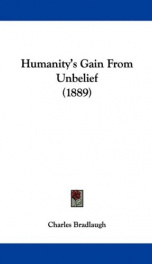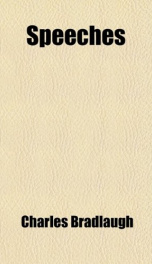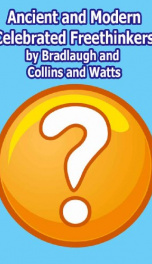Humanity's Gain from Unbelief

HUMANITYS GAIN FROM UNBELIEF and Other Selections from the Works of CHARLES BRADLAUGH WITH PREFATORY NOTE BY HIS DAUGHTER HYPATIA BRADLAUGH BONNER -- INTRODUCTORY NOTE -- THROWN on his own resources as a boy, with every mans hand against him, my father was both essentially and by f rceof circumstances a man of action, and his writings were usually inspired by the need of the time. His pen and his tongue were servants to be used to further the causes he had at heart weapons with which he sought to overcome the dragons of intolerance and superstition. Most of his writings appeared in his weekly journal, the National Reformer, or were issued in pamphlet form. There are, unfortunately, few books to his credit for these demanded more time than he was able to give. The essay, Humanitys Gain from Unbelief, which gives the title to the present selection, was prepared at the request of Allen Thorndike Rice for the North American Review of March, 1889. Although written less than two years before his death and when disease had already begun to sap his fine physique, the paper shows no sign of failing vigour in style or argument. In the openingsentences, commenting on the continuous modification in the dogma and practice of religion, he used the phrase, None sees a religion die, which has been quoted again and again down to quite recent times. While acknowledging the good done by individual Christians, he contended that the special services rendered to human progress by these exceptional men were not in consequence of their adhesion to Christianity, but in spite of it, and in direct opposition to Biblical enactments. This essay was immediately reprinted in various parts of America and Australia as well as here in England, and at once gave rise to a storm of controversy. Sermons were preached in refutation, and discussions took place in the provincial press. The Newcastle Weekly Chronicle, in particular, opened its columns to a lengthy discussion of the subject and, as a consequence, in the following June Mr. Bradlaugh received an invitation from the Rev. Marsden Gibson, a Newcastle vicar, to substantiate in debate the statements he had made. This debate took place in September, and caused much excitement in and around Newcastle. People came from long distances to hear it, and the hall proved too small to accommodate the crowds who desired to attend, so that large numbers were turned away on each of the two nights. Years afterwards some pitmen in a Durham mining village, talking to me of that occasion, recalled with pride and delight how they had clubbed together to hire a break to take them to Newcastle and back, and how they never went to bed that night but stayed up going over the points raised in the debate until the hour of their morning shift came round. Such was the enthusiasm of yester-year. The word Atheist has always been used as a term of obloquy by Christians, even by educated Christians who have not the excuse of ignorance. Misapprehension and deliberate misrepresentation of Atheism have been constant, and indeed are not unknown at the present day. In the late seventies of last century my father wrote A Plea for Atheism, a brief but careful examination of what Atheism really is and what it is not. He wrote this, he said, in the hope of removing some of the msny prejudices against Atheists... --This text refers to the Paperback edition.
Info about the book
Author:
Series:
Unknown
ASIN:
B003YMN5JE
Rating:
4/5 (2)Your rating:
0/5
Languge:
English
Users who have this book
Users who want this book
What readers are saying
What do you think? Write your own comment on this book!
write a commentif you like Humanity's Gain from Unbelief try:
Do you want to exchange books? It’s EASY!
Get registered and find other users who want to give their favourite books to good hands!




